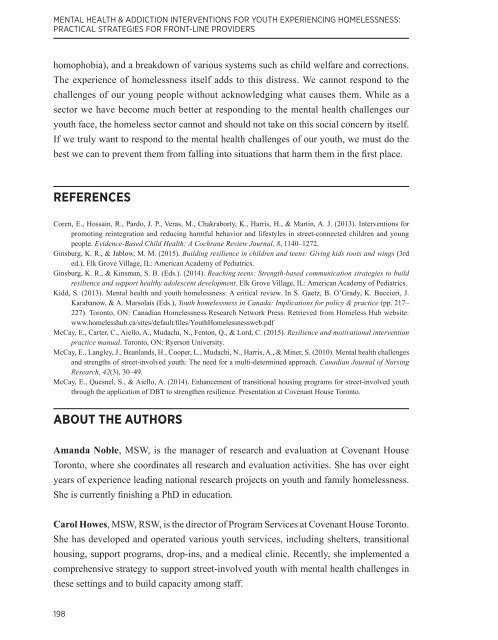COH-MentalHealthBook
Create successful ePaper yourself
Turn your PDF publications into a flip-book with our unique Google optimized e-Paper software.
MENTAL HEALTH & ADDICTION INTERVENTIONS FOR YOUTH EXPERIENCING HOMELESSNESS:<br />
PRACTICAL STRATEGIES FOR FRONT-LINE PROVIDERS<br />
homophobia), and a breakdown of various systems such as child welfare and corrections.<br />
The experience of homelessness itself adds to this distress. We cannot respond to the<br />
challenges of our young people without acknowledging what causes them. While as a<br />
sector we have become much better at responding to the mental health challenges our<br />
youth face, the homeless sector cannot and should not take on this social concern by itself.<br />
If we truly want to respond to the mental health challenges of our youth, we must do the<br />
best we can to prevent them from falling into situations that harm them in the first place.<br />
REFERENCES<br />
Coren, E., Hossain, R., Pardo, J. P., Veras, M., Chakraborty, K., Harris, H., & Martin, A. J. (2013). Interventions for<br />
promoting reintegration and reducing harmful behavior and lifestyles in street-connected children and young<br />
people. Evidence-Based Child Health: A Cochrane Review Journal, 8, 1140–1272.<br />
Ginsburg, K. R., & Jablow, M. M. (2015). Building resilience in children and teens: Giving kids roots and wings (3rd<br />
ed.). Elk Grove Village, IL: American Academy of Pediatrics.<br />
Ginsburg, K. R., & Kinsman, S. B. (Eds.). (2014). Reaching teens: Strength-based communication strategies to build<br />
resilience and support healthy adolescent development. Elk Grove Village, IL: American Academy of Pediatrics.<br />
Kidd, S. (2013). Mental health and youth homelessness: A critical review. In S. Gaetz, B. O’Grady, K. Buccieri, J.<br />
Karabanow, & A. Marsolais (Eds.), Youth homelessness in Canada: Implications for policy & practice (pp. 217–<br />
227). Toronto, ON: Canadian Homelessness Research Network Press. Retrieved from Homeless Hub website:<br />
www.homelesshub.ca/sites/default/files/YouthHomelessnessweb.pdf<br />
McCay, E., Carter, C., Aiello, A., Mudachi, N., Fenton, Q., & Lord, C. (2015). Resilience and motivational intervention<br />
practice manual. Toronto, ON: Ryerson University.<br />
McCay, E., Langley, J., Beanlands, H., Cooper, L., Mudachi, N., Harris, A., & Miner, S. (2010). Mental health challenges<br />
and strengths of street-involved youth: The need for a multi-determined approach. Canadian Journal of Nursing<br />
Research, 42(3), 30–49.<br />
McCay, E., Quesnel, S., & Aiello, A. (2014). Enhancement of transitional housing programs for street-involved youth<br />
through the application of DBT to strengthen resilience. Presentation at Covenant House Toronto.<br />
ABOUT THE AUTHORS<br />
Amanda Noble, MSW, is the manager of research and evaluation at Covenant House<br />
Toronto, where she coordinates all research and evaluation activities. She has over eight<br />
years of experience leading national research projects on youth and family homelessness.<br />
She is currently finishing a PhD in education.<br />
Carol Howes, MSW, RSW, is the director of Program Services at Covenant House Toronto.<br />
She has developed and operated various youth services, including shelters, transitional<br />
housing, support programs, drop-ins, and a medical clinic. Recently, she implemented a<br />
comprehensive strategy to support street-involved youth with mental health challenges in<br />
these settings and to build capacity among staff.<br />
198
















